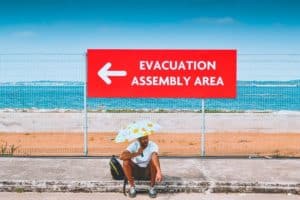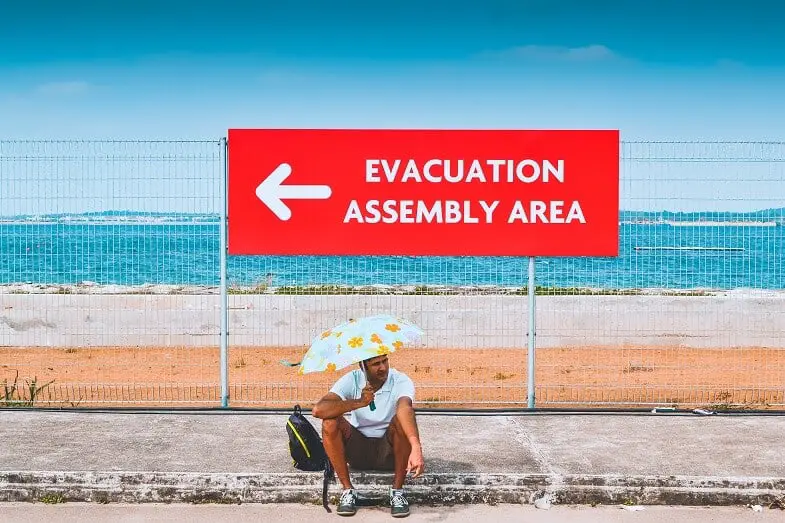Behind a “Be safe”, “stay safe” or “take care”, there is a person that means well to you. Even as a simple act of courtesy, a “be safe” can show positive attention from the person who’s saying it, so the best way to reply to it is to correspond to those feelings.
You will never be wrong with a friendly “Thank you” as a reply to the phrase “be safe”!

It doesn’t have to be a huge gesture; after all, it’s only a farewell response. And of course, everything has its context, so you want to consider that too.
Worry no more because in this article, we will try to build a sensible explanation of what the phrases “be safe” and “stay safe” mean and we will give you ideas on how to reply to them. Let’s get right to it!
What could “be safe” mean?
The expression usually falls into one of the following meanings, or a combination of them: as a way to show affection, as a sign of concern from the person saying it, or as a common courtesy from a stranger.
As a way to show affection
It could be a way for a protective person to say “I love you”, “I take care of you and your wellbeing”, or “Stay strong”. For this reason, it is usual to hear a “be safe” from an elder family member or a special other.
When it comes from a person who is otherwise far from your close friends and family, it could mean that person is developing positive feelings towards you.
As a sign of concern
If a person bids you farewell with a “be safe” and that person didn’t use to do that regularly, it could also point out a feeling of worry. If that’s the case, it could be a common way of saying goodbye, especially when the person parting ways is going on a long trip, to an unknown destination, or somewhere the person deems unsafe.
When we care about someone, we generally want them to be fine, and some people make efforts to protect their loved ones.
However, when the situation escapes our grasp, all we can do is hope that they stay safe, and “stay safe” is a way of expressing it.
As mere courtesy
Of course, for some people, saying things such as “be safe” or “take care” could be a matter of habit and politeness. This is true especially if the person is used to hearing that from their upbringing. When that’s the case, the more observant person will notice that “take care” or “be safe” comes from the person saying it as a common courtesy to everyone around them.
It is essential to point out that, when it comes to these expressions, context is vital. The way to interpret a “be safe” or “stay safe” could vary between cultures.
For example, it’s common in Latino households to hear it as a farewell, along with a “God bless you” or “May God / the Virgin keep you safe”.
On the other hand, we have the Chinese, who have no similar expression to “be safe” as Westerners use it. On the rare occasion, they would say “take care” or “be safe”, it would show deep concern and would involve a signal of real risk or danger.
It’s also important to differentiate the treatment between friends and family from the politeness of a stranger. Especially, if someone is developing feelings for you, they might say something like “text me when you get there / back home” or “give me a call sometime”, if you’re about to do a long trip.
A person’s upbringing, culture, and current relationship with you could point out to what, how, and why they say what they say. This distinction will tell you how to act accordingly, using the set of options you will find below.
How should I reply to a “be safe”?
There are many ways to reply to “be safe”; although they are limited to the farewell situation. It is vital to keep in mind to be as courteous and affectionate as the other person is to you.
Here are some options to reply to such a beautiful farewell.
Thank you!
A terrific way to correspond to someone elses’ good wishes is to state you appreciate those feelings. A friendly “thank you” is good enough to say goodbye in that situation.
Variations are also welcome, such as “Thanks”, and “I appreciate it”. Another way of showing gratitude for those feelings is our next option.
I will!
Replying with an “I will” or a “Will do” is another good way to answer. It shows the other person you are listening to them and that you care about them caring about you. “I will do my part” is a more heartfelt way of delivering your reply.
Other ways to express the same sentiment would be “no big deal” or “Don’t worry, I got this”.
These expressions can give the other person the sense of security they might be seeking.
You too!
As stated before, sometimes a “be safe” could mean “I love you” and “I deeply care about you”. And oftentimes, when people express their feelings, they expect to receive some kind of feedback from the other person.
Letting them know you also care about their safety and well-being could be an affectionate way to say goodbye.
You can try saying things such as “You take care too”, “Stay safe yourself” and for those in love, something more elaborate like “I can’t wait to see you again, so you stay safe too” can be very romantic.
Mix it up
It’s okay to reply by saying “Thanks, I will!” Or “I will do my part, make sure you do too!”. Whatever comes naturally to you at the moment will do just fine.
Go beyond words
For some people, answering with words could feel like an overstatement or might be necessary. A tender glance into the other person’s eyes might suffice as a reply.
Also, a hug, a friendly handshake, or a pat on the back could work if the situation allows it. Remember that person means well to you.
How not to reply to a “be safe”?
There are good ways to reply to a well-meant goodbye… and there are not-so-good ways.
Again, it all depends on timing and context. Perhaps you don’t want to come across as rude or cold; but also, you don’t want to sound inappropriate or overly affectionate.
If any of those is your case, here are a few pointers to the replies you want to tread lightly on:
No answer
As previously discussed, body language and physical gestures can go a long way to correspond to a good wish.
For this reason, it is important to consider what we do if we go the non-verbal route: turning your back on a “be safe” could come across as dismissive and rude.
Even if you feel patronized by the “be safe” thing, do the right thing and answer, even if it’s out of politeness. Any of the ways to reply above are short, polite, and sound natural and sincere.
OK.
Even if you’re not the talkative type, there are ways to show affection and keep it short and sweet.
However, too short might also be misinterpreted. A plain “OK” could sound cold and dismissive. But then again, context and even the voice tone can change a dull “OK” into a friendly way of answering.
If you answer with “Okay, I will!” it makes a difference in how your reply is interpreted by the other person.
Goodbye.
It might sound like the right thing to say in a “goodbye” scenario, but as discussed before, a “stay safe” could be slightly more important than that. A plain, stern goodbye could sound to the other person like an “I don’t care” or a “leave me alone”, leaving the person even more worried for you.
Remember to keep your interactions as courteous and affectionate as possible in the way you receive them.
I love you
Even though “be safe” is an affectionate phrase to part ways, and it’s okay to express your feelings for the people you care about, remember that for some people, saying goodbye in that manner is only a courtesy.
It would be weird to say “I love you” to your boss or someone you have a strictly professional relationship with out of the blue.
For this reason, let’s keep this particular reply in the “comes with context” bin.
Final thoughts
It is true that a farewell such as “be safe”, “stay safe” or “take care” can catch us off guard if we’re used to a plain “Bye!” or “See you around!”.
For some of us, it can be hard to follow every social cue and understand them to a tee. Not knowing what to do or say can make us feel anxious.
So, a little bit of thought and preparation can go a long way, even for those situations that might come naturally to others.

Sophie Hammond is a journalist, psychologist, and freelance speechwriter for people in politics and business. She lives on the edge of the Rocky Mountains with her dog and a lifetime supply of books. When she’s not writing, she can be found wandering through nature or journaling at a coffee shop.

